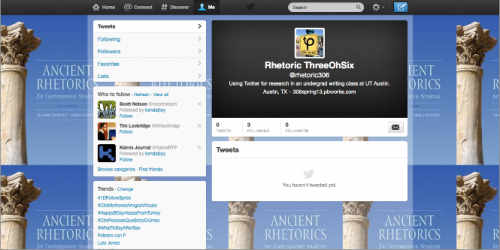
Image Credit:
Class Twitter account, @rhetoric306, with Ancient Rhetorics for Contemporary Students (5th ed.) as background
I ask my RHE 306 class, Rhetoric and Writing, to focus their writing for the semester around a single public issue. I want students in my class to concentrate on the kinds of disagreements that, however intractable, demand a response. So I ask them to frame their issues as policy questions. As we near the time when I ask students to begin researching their issues in earnest, I've been looking for ways to improve my lesson on library research.
I usually tour students around the library website, walk them through different resources, databases, and ways to search the library site. I also like to give them an article that cites it sources and show them how to track down these sources' originals. They tend to come away from this exercise as big fans of Google Scholar—probably because it's not too far away from what for most of them is already their primary research tool: Google.
Incorporating Your Own Research
Because I allow my students to select their own topics for the semester, I often get a wide range of mostly current public issues. I'm not a news junkie, but I could be, so I restrict my news intake to my favorite cable news podcast and to Twitter. That usually gives me some broad knowledge about the kinds of topics my student choose. As I set my students to in-class exercises like practicing summaries, I like to bring in articles I find that relate to students' topics and maybe challenge their established ways of thinking.
Where do I find those kinds of articles? Well, Twitter. I've been on Twitter (@kendalljoy) for about 5 years, and because I like to read everything I've missed since the last time I checked Twitter, I like to keep the list of people I follow relatively small and manageable. That means I unfollow people I don't read carefully and add new followers only when they have consistently interesting tweets.
Twitter for Instant Research
I only just realized I've been depriving students of one of my own main research tools: Twitter. Yes, they need to learn to do scholarly research using the library resources, but this kind of research often leads to useful finds on an issue's background and history, or to relatively refined opinion writing that's been through a slower editorial gatekeeping process. They need all that. But sometimes they can't distinguish it from anything else they'd find online: daily news, blogs, etc. But that kind of up-to-the-minute material is useful, too, especially when students are writing about issues that are even now the subject of public debate and new policy proposals: gun control, immigration reform, abortion restrictions, and the like.
I'm developing a lesson plan to teach my students to conduct research with Twitter. (In a few weeks, I'll post it to the DWRL's Lesson Plans site) What I envision is a class Twitter account (@rhetoric306) and an initial requirement of a professional Twitter account (I'll allow students to use personal account but invite them to create a fresh start if they'd like); a proposed hash tag for class tweets that is short, unique, and informative; and a tweet introducing one high-quality Twitter account relevant to their topic that they'd like the class to follow. The goal will be to get students to help each other conduct current research even as they learn to distinguish between the kinds of material they'll find informally online and the more academic resources they'll need to get through the library.
Twitter Dreams
I've been looking for ways to incorporate more digital and social media into my classes, but I can be choosy about fitting the form to the lesson. I'm excited about using Twitter to teach public issues research because it feels both a little technologically adventurous and because its germane to the classroom topic. My hope is that my students will invent ways of using our Twitter network to help each other and to write that I haven't been able to anticipate.
Meanwhile, I'm drawing up guidelines to help them formally learn to use the medium and to maximize Twitter's research potential. I can already imagine the conversations we'll provoke about commonplaces, expertise, journalistic reporting versus opinion writing, and invention in 140 characters. Are you using Twitter in your classroom? What are the issues you'd want a lesson plan to address? What resources have you found for students using Twitter in class? Tweet your answers to me @kendalljoy!

